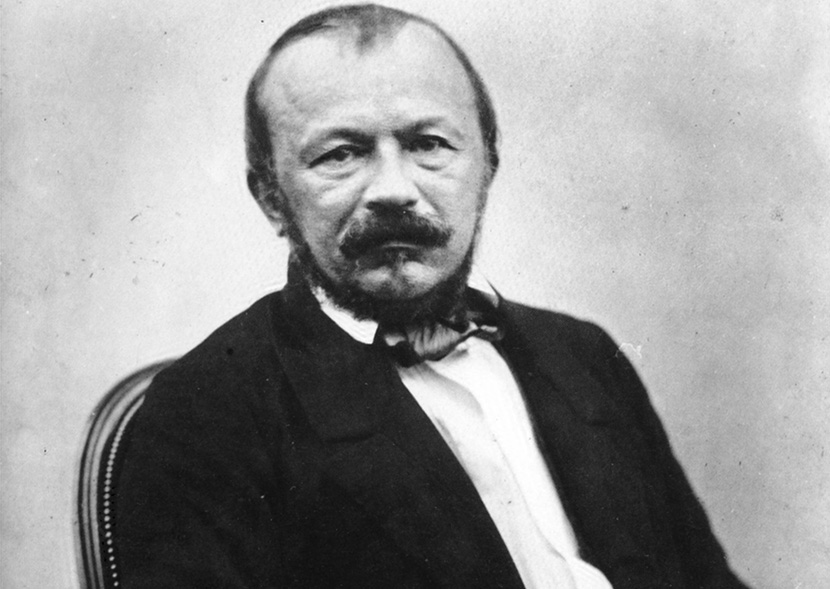About the Author
Gérard de Nerval
1808 – 1855
 Photograph of Gérard de Nerval by Nadar.
Photograph of Gérard de Nerval by Nadar. Early Life
Gérard de Nerval was born Gérard Labrunie on May 22, 1808, in Paris. His mother died when he was two, and he was brought up by a great-uncle in the countryside of Valois at Mortefontaine.
As a teenager he attended classes alongside Théophile Gautier, who became a lifelong friend, and at age twenty, his translation of Goethe’s Faust won him his first literary acclaim.
He worked various jobs and attended medical school to placate his father’s desire for him to establish himself in a professional career, but Gérard was irresistably drawn to literature and a circle of Bohemian artists and friends, of whom his father disapproved. Among these were older and more well-known authors including Victor Hugo, Alexandre Dumas, and Honore de Balzac.
Travel and Romanticism
In his early years he had been interested in the classics, but he was increasingly influenced by Romanciticism, which sought to break from convention, introduce new and exotic influences, and to emphasize emotion as opposed to strict reason.
In January 1834, Nerval—for he had by then adopted his nom de plume—inherited around 30,000 francs. He used the money to travel throughout Italy, the first of many journeys for the nomadic poet. On his return to Paris, he produced a spectacularly unprofitable literary journal and, in a romantic flourish at the onset of his infatuation with the actress Jenny Colon, he bought an extravagant antique bed. Having paid for the bed, he slept in a mattress on the floor, for he hadn’t enough money left to furnish it. When asked, “Who sleeps there?” he responded: “My imagination.”
By 1836, Nerval was in debt. He turned to journalism to make money and wrote for the theater in the hopes that a successful production would provide a much needed windfall. He traveled more, to Belgium, to Germany, and to Austria where he ran out of money again. He led a precarious existence, and an unhappy conclusion to his courtship of Jenny Colon, along with insurmountable financial difficulties, led him into a deep depression.
On January 1, 1841, he had a premonition of his own death, and the next day he was in a state of extreme nervous excitement. He fixed his gaze on a star which seemed to him to be the star of his destiny and started walking towards it. Then, in a sudden ecstasy, he threw off his clothes and stretched out his arms, awaiting the moment when his soul would leave his body and be drawn up by magnetic attraction to the star. He was taken by night watchmen to the police station, where he continued to hallucinate, eventually becoming so violent that he had to be locked in a cell.
Nerval spent the next months recovering from his “ecstatic fever” in a private asylum. In March he suffered a relapse, experiencing once again what he called “the spilling-over of dream into real life,” and it was not until November that he finally emerged from the clinic, apparently cured.
On December 22, 1842 Nerval set off again, traveling to Alexandria, Cairo, Beirut, Constantinople, Malta and Naples. Returning to Paris a year later, he began to publish articles about his trip in 1844, and his Voyage en Orient appeared in 1851.
He resumed his work writing for the papers, living hand-to-mouth, and it wasn’t long before he traveled again, to Belgium and Holland, with his friend Houssaye, and later to London. His assiduous efforts writing for the theater met with continual disappointments as one production after another was canceled or failed to capture the enthusiasm of the public.
In 1852, Les Illuminés, a collection of stories about eccentrics, was published. Sylvie and Filles du Feu followed in 1853 and 1854, but these, the final years of the author’s life, were spent in dire financial and emotional straits.
Final Days
He was plagued by fears of illness and death, by the anxiety of fulfilling commitments and the dread of creative impotence, by nightmares and morbid reflections nourished by increasing isolation. Friends were bewildered by the mystical problems and illusions that preoccupied his mind. He had extended hallucinations. One night, the stars in the sky seemed to him to have been extinguished, and he believed it to be the end of the world, that “the earth had left its orbit and that it was drifting in the firmament like a dismasted vessel.” Several months later, finding himself in a downpour, he imagined it to be the beginning of a second universal deluge. Soon he was reinstitutionalized, and in the hospital he worked on Aurélia, a personal account of his illness.
After leaving the hospital against the advice of his doctor, he wandered the streets, homeless, for several weeks. He tried to finish Aurélia, but found himself paralyzed by gloomy thoughts and was unable to write more than a few lines a day. On the morning of January 26, 1855, after a bitterly cold night, he was found hanging from the bar of a a cellar window in a squalid alley. Discovered in the pockets of the dead man were a passport for Constantinople, the last few manuscript pages of Aurélia, and two sous.
Artistic Legacy
For more than seventy years after his death, Nerval’s genius went largely unrecognized. Disregarded by critics, he was considered a minor romantic whose later works were the obscure productions of a deranged mind. But Nerval had a surprisingly modern sensibility, and time has procured him recognition. Baudelaire paid tribute to his “brilliant, active and luminous intellect”; Apollinaire reflected, “I should have loved him like a brother”; and Proust considered him “one of the three or four greatest writers of the nineteenth century.” Later, the Surrealists acclaimed him, so that today Nerval’s position in the history of French literature is well established.
One of the three or four greatest writers of the nineteenth century.
Marcel Proust

